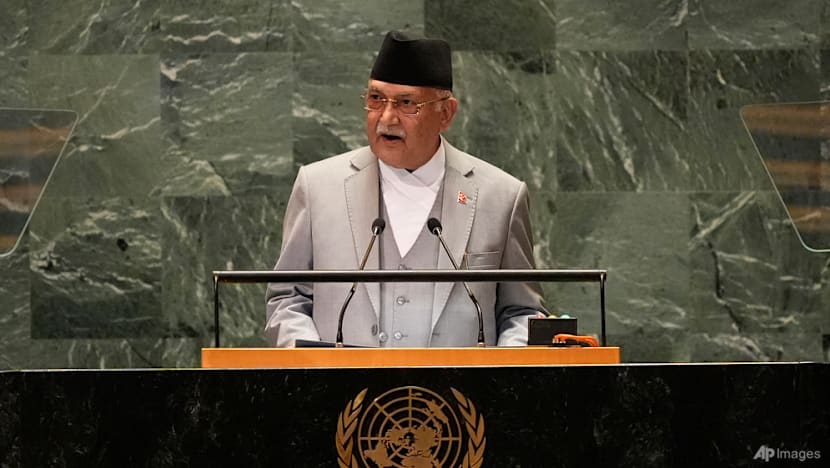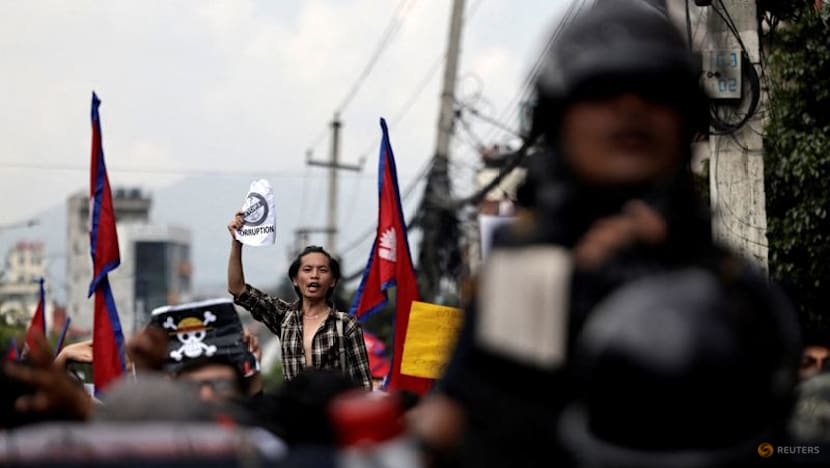Young anti-corruption protesters oust Nepal PM KP Sharma Oli
Protests against a social media ban in Nepal turned deadly on Monday (Sep 8) after at least 19 people were killed during clashes between the police and demonstrators.

Prime Minister of Nepal KP Sharma Oli addresses the 79th session of the United Nations General Assembly on Sep 26, 2024. (File photo: AP/Pamela Smith)
KATHMANDU: Nepal Prime Minister KP Sharma Oli was forced to resign on Tuesday (Sep 9) by angry young anti-corruption protesters who defied a curfew and clashed with police a day after 19 people died in a first day of protests.
The outrage was sparked by a social media ban, which Oli's government lifted after police fired tear gas and rubber bullets at protesters trying to storm parliament, and 100 people were injured alongside the 19 dead.
But there was no let-up in the protests on Tuesday, which plunged Nepal into fresh political uncertainty.
The unrest is the worst in decades in the poor Himalayan country that is wedged between India and China and has struggled with political instability and economic uncertainty since protests led to the abolition of its monarchy in 2008.
Young Nepalis have for years been frustrated at the lack of jobs, and millions have gone to work in the Middle East, South Korea and Malaysia, mainly on construction sites, from where they send money home.
"In view of the adverse situation in the country, I have resigned effective today to facilitate the solution to the problem and to help resolve it politically in accordance with the constitution," Oli said in his resignation letter to President Ramchandra Paudel.
An aide to Paudel told Reuters the president had begun the process of finding a new premier, but also summoned protest leaders for talks.
Army chief Ashok Raj Sigdel, in a video address, urged the protesters to end the unrest and avoid further loss of life and property, and come for talks.
In a separate statement the army said it was firmly committed to protecting people's lives and property.
The US urged all sides to refrain from violence.
A State Department spokesperson said the US remained a "steadfast partner of Nepal, committed to our shared interests in stability, prosperity, and democratic governance".
Jubilant youths entered the parliament complex on hearing the news, waving their hands in the air and shouting slogans as smoke arose from sections of the building.
"We won," one wrote in huge orange letters on the wall of the parliament building.
Although many protesters remained on the streets, there was no more violence as security forces kept their distance.
PM'S HOUSE RANSACKED
Oli, 73, was sworn in for his fourth term in July last year as Nepal's 14th prime minister since 2008. Two of his cabinet colleagues had resigned on "moral grounds" on Monday.
Early in the day, Oli had summoned all parties, saying violence was not in the interest of the nation and calling for peaceful dialogue. He did not respond directly to the complaints of corruption.
But protesters continued gathering at parliament and elsewhere in the capital, defying an indefinite curfew.
They set fire to tyres on some roads, threw stones at police in riot gear and chased them through narrow streets.
Witnesses also said that protesters were setting fire to the homes of some politicians in Kathmandu, and local media reported that some ministers were plucked to safety by military helicopters.
The Singha Durbar area, which houses the Prime Minister's Office and other ministries as well as Parliament House, and Oli's private residence were also set on fire, they said.
Footage circulating on social media showed former prime minister Sher Bahadur Deuba and his wife Arzu Rana, foreign minister under Oli, and Finance Minister Bishnu Paudel being attacked by protesters.
Reuters could not immediately verify the information.

KATHMANDU AIRPORT SHUT
Kathmandu airport, Nepal's main international gateway, was closed because of smoke from fires set by protesters.
Organisers of the protests, which spread to other cities in the Himalayan country, have called them "demonstrations by Gen Z", driven by young people's widespread frustration with the government's perceived lack of action to tackle corruption and boost economic opportunities.
"The protest was intended, first and foremost, against the rampant corruption in government," a protester said in an email to Reuters, signing off as 'A concerned Nepali citizen'.
Young Nepalis had been posting on social media about the "luxurious lives of the families and children of corrupt politicians and civil servants" until the government clamped down on the platforms, the email said.
Last week, Oli's government blocked access to several online platforms for allegedly failing to register, saying social media were being used to spread disinformation and commit fraud.
Critics said it was an attempt to throttle free speech, a charge the government denies, citing misuse of social media to spread disinformation and commit fraud, among other concerns.













